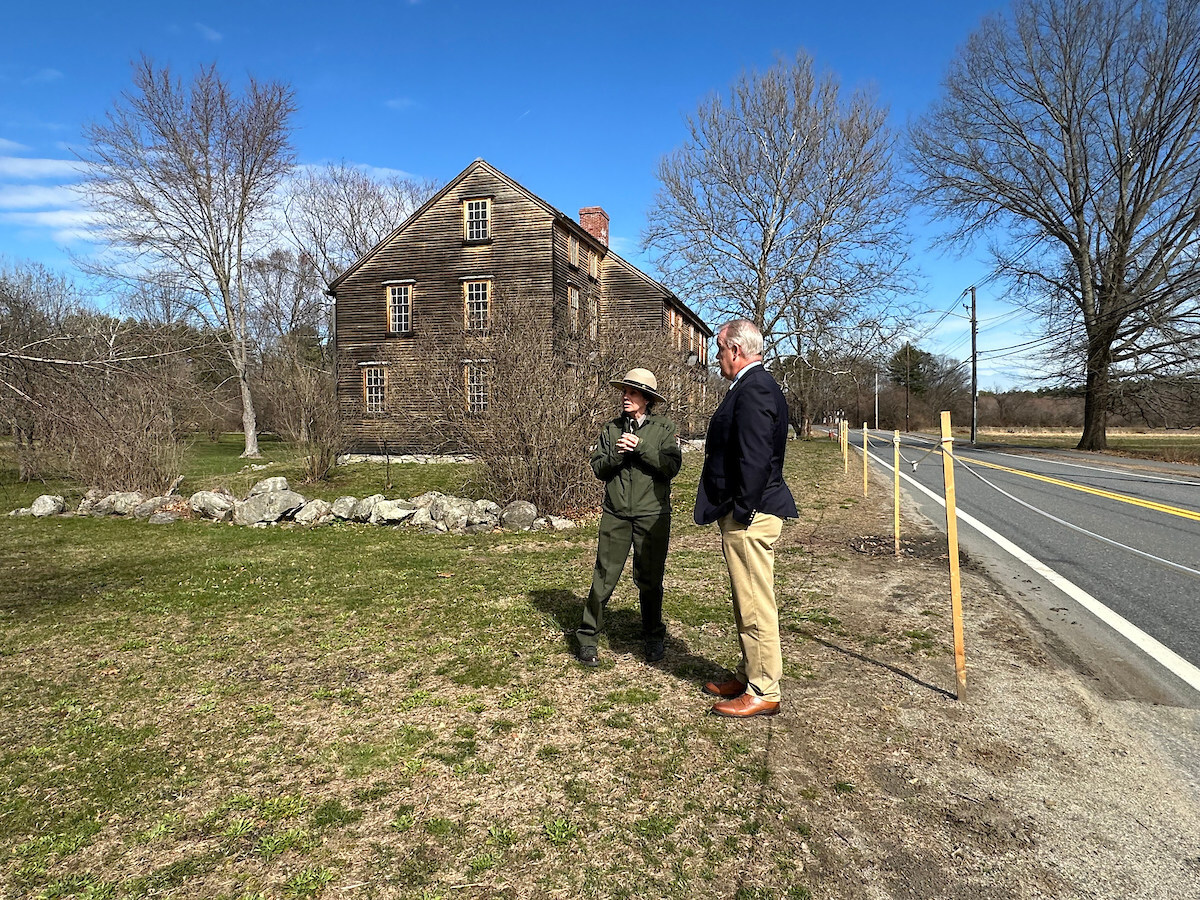More Post from the Author
- ECW ohlasuje grant vo vke 2 miliny USD pre deti zasiahnut povodami v Pakistane
- Ragnarok 3 Reveals the 'Emperium Showdown' GVG Gameplay Trailer
- Ampace dvoile ses avances en matire de motos lectriques et de solutions d'change de batteries l'EICMA
- Lawproactive Launches Next-Generation CRM, Marrying Data and Location with Geo-Optimized Funnels for Attorney Lead Generation
- Arta announces expansion of Arta AI, aiming to empower every financial advisor and wealth manager with an AI Sidekick; onboards new institutional customers
HISTORIC FARM THAT SPARKED THE AMERICAN REVOLUTION ADDED TO MINUTE MAN NATIONAL HISTORICAL PARK

Preservation of the Barrett Farm property ahead of the 250th anniversary of the Battles of Lexington and Concord highlights need to protect the hallowed places where American independence was won
CONCORD, Mass., April 14, 2025 /PRNewswire/ --A two-acre portion of the Barrett Farm, the objective of the British Army on the first day of the American Revolution, has been saved to become part of Minute Man National Historical Park - an important preservation victory just ahead of the 250th anniversary of the Battles of Lexington and Concord, the National Park Service and the American Battlefield Trust announced today.
In April 1775, British forces moved out of Boston toward the farm of Patriot leader Colonel James Barrett, preparing to seize a stockpile of artillery, gunpowder and ammunition being stored by colonists. Ultimately, they found nothing - but their march to the Barrett Farm attracted minutemen and militia from the surrounding communities, leading to the "shot heard 'round the world" and sparking a conflict that would lead to American independence.
The newly preserved property sits just west of existing park holdings on Barrett Mill Road, bringing the Barrett Farm unit of Minute Man National Historical Park to a total of five acres. It was purchased by the National Park Service from private owners using $1.86 million in federal funding championed by the American Battlefield Trust. The Trust also lent important staff expertise to facilitate the acquisition in time for the 250th anniversary of the battle at Concord.
"By preserving the sites of the American Revolution, we honor the service and sacrifice of our nation's first citizen soldiers," said David Duncan, president of the American Battlefield Trust. "Protecting these hallowed places creates an enduring legacy that will benefit Americans long after the country's 250th birthday has ended. Future generations will be able to walk in the footsteps of those early patriots and gain a deeper understanding of our war for independence."
Ahead of the nation's 250th anniversary, the Trust is working toward an ambitious goal to permanently protect 2,500 acres of Revolutionary War battlefield land, including historic treasures like the Barrett Farm.
Over the years, other sections of the Barrett Farm have been preserved by the National Park Service and its local partners. The historic farmhouse, built in 1705, remained in the Barrett family until the early 1900s; it was then stewarded by the McGraths for another century, until they sold it to Concord nonprofit Save Our Heritage in 2002. The home and 3.4 surrounding acres joined the park in 2012 following a $1.5 million restoration campaign and a legislative push to expand the park's authorized boundary.
The farm itself played a pivotal role in sparking the first battles of the Revolution: On April 19, 1775, a British column seeking a stockpile of munitions first encountered resistance at Lexington, where there was a brief firefight on the battle green - resulting in the first casualties of the war. The British column continued toward Concord, where a contingent of four companies broke off and marched about two miles further west to Colonel Barrett's Farm, where they believed a cache of Patriot supplies was located. But the forewarned colonists were able to clandestinely move the weapons, leaving the Redcoats empty-handed.
Meanwhile, Colonel Barrett, in charge of the Concord Militia, had taken up position near the Old North Bridge. Troops under his command fired what poet Ralph Waldo Emerson called the "shot heard 'round the world." Then came a bloody retreat along the battle road to back to Boston, including the ambush by the remnants of the Lexington militia that is often referred to as the "Parker's Revenge site" - a location that the Trust helped secure and integrate into the National Historical Park.
Special events remembering the 250th anniversary of the start of the Revolutionary War continue throughout the week. The full National Park Service schedule is available for view here. On Thursday evening, April 17, the Trust will hold a YouTube Premiere for its groundbreaking virtual reality video showcasing the events at Lexington and Concord.
From a grassroots organization started by historians nearly four decades ago, the American Battlefield Trust has grown into one of the most successful private heritage land preservation organizations in the nation. The Trust is dedicated to preserving America's hallowed battlegrounds and educating the public about what happened there and why it matters today. The nonprofit, nonpartisan organization has protected nearly 60,000 acres associated with the Revolutionary War, War of 1812 and Civil War, representing more than 160 sites in 25 states. Learn more at www.battlefields.org.
Visual assets from event available by emailing [emailprotected].
SOURCE American Battlefield Trust

More Post from the Author
- ECW ohlasuje grant vo vke 2 miliny USD pre deti zasiahnut povodami v Pakistane
- Ragnarok 3 Reveals the 'Emperium Showdown' GVG Gameplay Trailer
- Ampace dvoile ses avances en matire de motos lectriques et de solutions d'change de batteries l'EICMA
- Lawproactive Launches Next-Generation CRM, Marrying Data and Location with Geo-Optimized Funnels for Attorney Lead Generation
- Arta announces expansion of Arta AI, aiming to empower every financial advisor and wealth manager with an AI Sidekick; onboards new institutional customers

